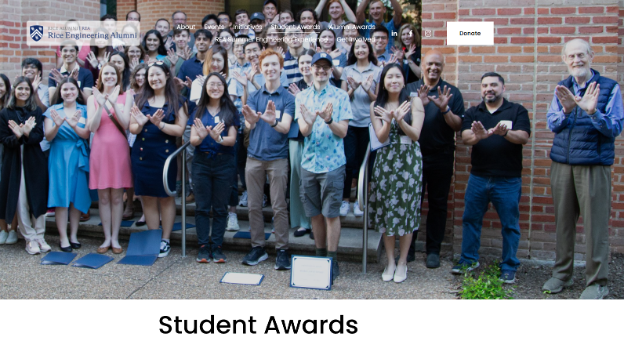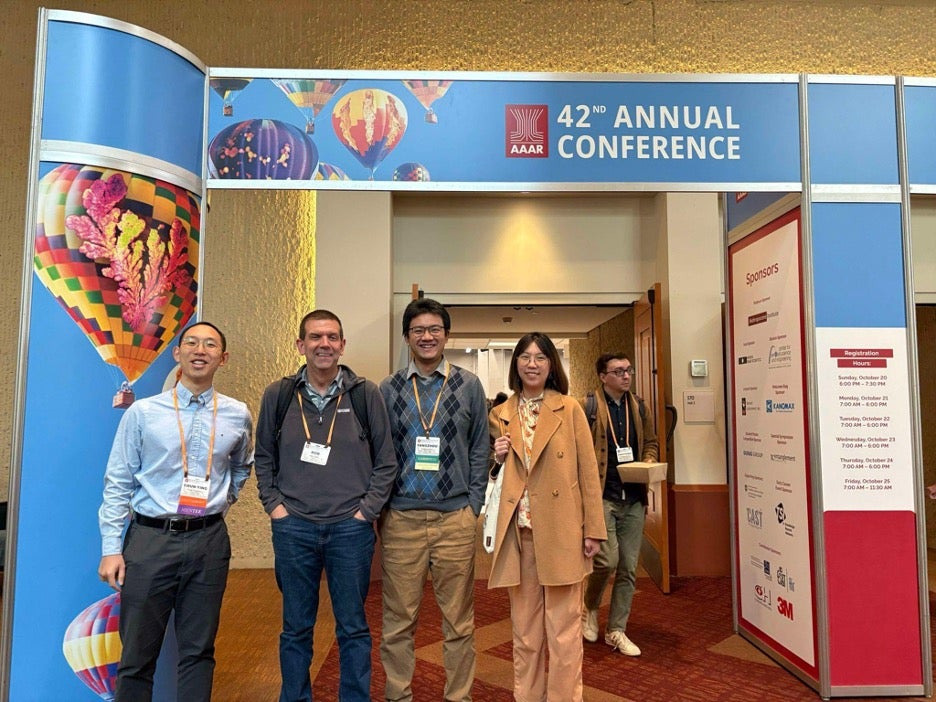The picture of Griffin’s group includes current and previous members. From left to right: Chun-Ying (current Rice Ph.D. student), Professor Rob Griffin, Dr. Fangzhou Guo (previous Ph.D. student at Rice, current senior scientist at Aerodyne Research), and Tianchang (Athena) Xu (previous undergraduate student at Rice, current Ph.D. student at Georgia Tech)
Attending conferences is an important part of graduate school training. At conferences, you have a chance to share your research studies, discuss new ideas, and receive feedback to polish your ideas. Unfortunately, attending conferences is pricey. This article provides you with some resources to support your travel to conferences.
1. Rice Engineering Alumni (REA) Graduate Student Travel Grant Program
REA supports Rice engineering graduate students to attend conferences or professional meetings to present their research work. The application for the award is due in January and September for spring and fall semesters. Applicants can apply for up to $1,500, but historically most winners have received partial funding grants. To apply for the travel grant, applicants need to submit a five-page proposal. Information can be found on the REA website.

Picture source: https://www.riceengineeringalumni.org/student-awards
2. Your department at Rice University
Some departments support students attending both domestic and international conferences. For example, the Department of Religion reviews four times per year for students’ travel grant proposal. If you are awarded, you can receive up to $1,500 per fiscal year (July 1 to June 30).
If your department does not have the travel grant program or award, it is still worth asking staff in your department office. Sometimes, there are travel grants to support specific research fields.
3. Conference Student Travel Grant
Most conferences provide limited travel grants for graduate students. These grants can offset your total travel cost. For example, the American Association of Aerosol Research (AAAR) provides $500 for students who study in the U.S., $1000 for students studying in the Americas Outside of the U.S., and $1500 for international professionals in the Americas outside of the U.S. and Canada.
4. Volunteering Student Assistant in Conferences
Volunteering is also a good way to receive a travel grant. For example, the AAAR provides $500 and tutorials which are valued at $300 to Social Media Ambassadors helping the conference post information and collaborating intensively with working group.
The picture of Griffin’s group includes current and previous members. From left to right: Chun-Ying (current Rice Ph.D. student), Professor Rob Griffin, Dr. Fangzhou Guo (previous Ph.D. student at Rice, current senior scientist at Aerodyne Research), and Tianchang (Athena) Xu (previous undergraduate student at Rice, current Ph.D. student at Georgia Tech)
About the author:
Chun-Ying Chao is from Taiwan and is a current Ph.D. student in the Department of Environmental Engineering under Dr. Robert Griffin. He received his bachelor’s degree in Chemical Engineering from National Cheng Kung University in Taiwan and his master’s degree from Washington University in St. Louis.
Further Reading:
Rice Awards Wagoner Scholarships to 14 graduate students
Three tips for improving your leadership
Two Ph.D. students selected to participate in Global Young Scientists Summit

